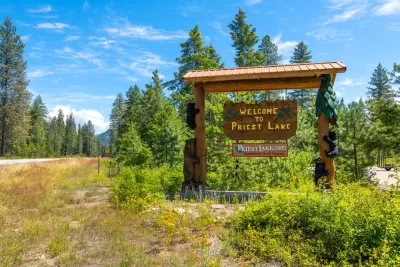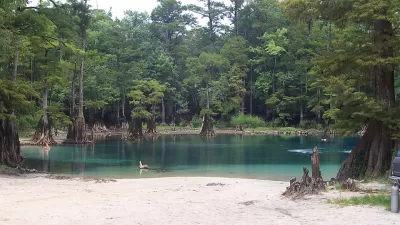The future of the Clean Water Act could look much different after fossil fuel interests and the Supreme Court done with it.

A bill designed to overhaul federal permitting processes was a controversial part of the deal that helped get the Inflation Reduction Act across the finish line. The expectation that the deal would eventually make it easier to build large federal infrastructure projects provoked loud debate. One one side, proponents argues that environmentalists would have to cede legal and regulatory ground to make it easier to develop new wind and solar power capacity. On the other side, opponents, including Senator Bernie Sanders, said the deal was coming at too high of a cost for the environment, and the main beneficiary of changes would be fossil-fuel interests, not clean energy.
The latest news reveals some of what the latter group was worried about, as provisions of the Energy Independence and Security Act of 2022, announced by Senator Joe Manchin last week, would take aim at the Clean Water Act—one of the most significant and highly contested environmental regulations in U.S. history.
According to an article by Maxine Joselow for the Washington Post, the bill “includes a provision that would modify Section 401 of the Clean Water Act, which gives states and tribes the authority to grant, deny or waive certification of permits to fill or dredge federally protected waters such as rivers and wetlands.”
According to the Washington Post’s investigation, Equitrans Midstream, which owns a 48.1 percent stake in the Mountain Valley Pipeline, which would carry natural gas more than 300 miles from West Virginia to Virginia, voiced support for changing the word “discharge” to “activity” in the Clean Water Act. The effect of this change and others is unclear, according to legal analysts cited in the article. Some expect more certainty; others expect some powers to reject permits outright because of the changes.
Simultaneously to these new questions about the future of the Clean Water Act, the Supreme Court is considering a case that could also undo the definitions central to the “Waters of the United States Rule,” as established by the previous court ruling of Rapanos v. United States. A separate article for the Washington Post by Robert Barnes provides more detail on the Supreme Court case, Sackett v. Environmental Protection Agency, which will enter oral arguments during the first week of October.
FULL STORY: Manchin eyes changes to Clean Water Act in permitting bill

Maui's Vacation Rental Debate Turns Ugly
Verbal attacks, misinformation campaigns and fistfights plague a high-stakes debate to convert thousands of vacation rentals into long-term housing.

Planetizen Federal Action Tracker
A weekly monitor of how Trump’s orders and actions are impacting planners and planning in America.

San Francisco Suspends Traffic Calming Amidst Record Deaths
Citing “a challenging fiscal landscape,” the city will cease the program on the heels of 42 traffic deaths, including 24 pedestrians.

Defunct Pittsburgh Power Plant to Become Residential Tower
A decommissioned steam heat plant will be redeveloped into almost 100 affordable housing units.

Trump Prompts Restructuring of Transportation Research Board in “Unprecedented Overreach”
The TRB has eliminated more than half of its committees including those focused on climate, equity, and cities.

Amtrak Rolls Out New Orleans to Alabama “Mardi Gras” Train
The new service will operate morning and evening departures between Mobile and New Orleans.
Urban Design for Planners 1: Software Tools
This six-course series explores essential urban design concepts using open source software and equips planners with the tools they need to participate fully in the urban design process.
Planning for Universal Design
Learn the tools for implementing Universal Design in planning regulations.
Heyer Gruel & Associates PA
JM Goldson LLC
Custer County Colorado
City of Camden Redevelopment Agency
City of Astoria
Transportation Research & Education Center (TREC) at Portland State University
Jefferson Parish Government
Camden Redevelopment Agency
City of Claremont





























